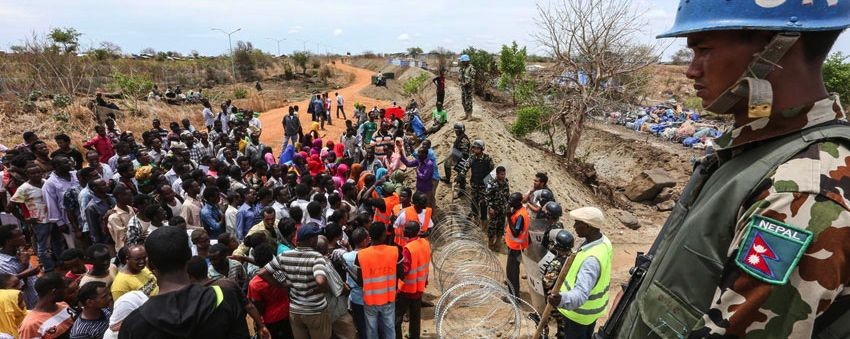Relief workers in South Sudan last week were unable to reach a number of key areas owing to poor road and airstrip conditions and fighting in Bentiu, Nasser and elsewhere.
But aid agencies have welcomed the promise of a ‘month of tranquility’ made on 4 May followed by a high-level ceasefire commitment on 9 May. Oxfam is calling for a “mammoth aid effort” to exploit the new access opportunities.
However, humanitarian officials continue to warn that current funding is inadequate to the scale of the crisis, which has displaced about 1.3 million people. Donor governments are expected to meet in Oslo, Norway, on 20 May to discuss this issue.
The aid agencies say they are not yet ready to call the situation a ‘famine’, though they are already treating thousands of malnourished people.
OCHA, the UN humanitarian coordination office, released a situation report on Saturday covering the period 3-9 May. The information below represents a selection of highlights from the report:
Food and nutrition
Aid organizations have set up or supported 259 outpatient treatment programmes for malnutrition across the country, including 27 with stabilization centers and 148 with targeted supplementary feeding programmes.
Since the start of the crisis 15,223 children (0-59 months) were admitted to treatment programmes for severe acute malnutrition, and another 18,668 children were admitted to treatment programmes for moderate malnutrition.
NGOs that have been screening children for malnutrition in different areas have found that 21,275 out of 343,827 children screened suffered from acute malnutrition (5.9%), while 44,410 suffered moderate malnutrition (12.4%).
Out of 78,573 pregnant and lactating women screened for acute malnutrition, 20,571 (28%) were found to be acutely malnourished.
The UN World Food Programme conducted food airdrops in Ganyel, Unity State, and Lankien and Motot, Jonglei State and other locations in Upper Nile. Food shortages are reported to be particularly acute in Upper Nile.
Health and disease
One cholera case was confirmed on May 6 in UN House camp in Juba, but none of the people close to the victim appear to have caught the disease. Health workers set up a task force to take precautions against an outbreak.
Oral cholera vaccination campaigns have been completed in four camps – Malakal, Mingkaman, Tomping and UN House. Another campaign is ongoing in Bor.
Seven cases of Hepatitis E were identified and five were confirmed in Mingkaman camp, Lakes State. The disease, which can cause jaundice, nausea and fatigue, is normally prevented by improving sanitation conditions.
Medical teams seeking to travel to Ayod, Renk and Ulang counties in Jonglei and Upper Nile states were prevented by insecurity. Flights to several other areas were also postponed due to either insecurity or wet airstrip conditions.
Camps and protection sites
The UN says overcrowding and rains are increasing the risk of disease outbreaks at the ‘Protection of Civilians’ (PoC) site in Bor, Jonglei.
Humanitarian services at the PoC site in Bentiu have been improved significantly over the last two weeks, after a major influx of new refuge-seekers in mid-April stretched humanitarian resources at the site. Improvements have been made to the grounds and cholera preparations have been made.
However, fighting in Bentiu town last week hampered efforts to scale up and provide water and sanitation services, which earlier were identified as severely inadequate. The sanitation (WASH) sector overall is lacking personnel and funding.
Also in Bentiu, there are a number of separated children in the PoC sites, creating a need for identification, registration and interim care of these children.
Planned groundwork improvements to the Malakal PoC, which suffered flooding, have been delayed by rains. Communities were mobilized to carry out ‘hazard mitigation measures’ following reports of fire and flooding in the camp.
Aid agencies scaled back ‘non-essential’ assistance at the Tongping UN base in Juba, after some incidents of violence against humanitarians. Consultations were held among community leaders, UN security and aid workers to address the issue.
A new PoC camp site was established on 27 April for about 700 ethnic Nuers who fled violence in Wau town following the defections at Mapel and Wau army bases.
Photo: Relocation of Displaced Foreign Nationals to New Protection of Civilians at UN House. UN Photo/Isaac Billy
Related coverage:
Key humanitarian updates (5 May)
Key humanitarian updates (19 Apr.)




